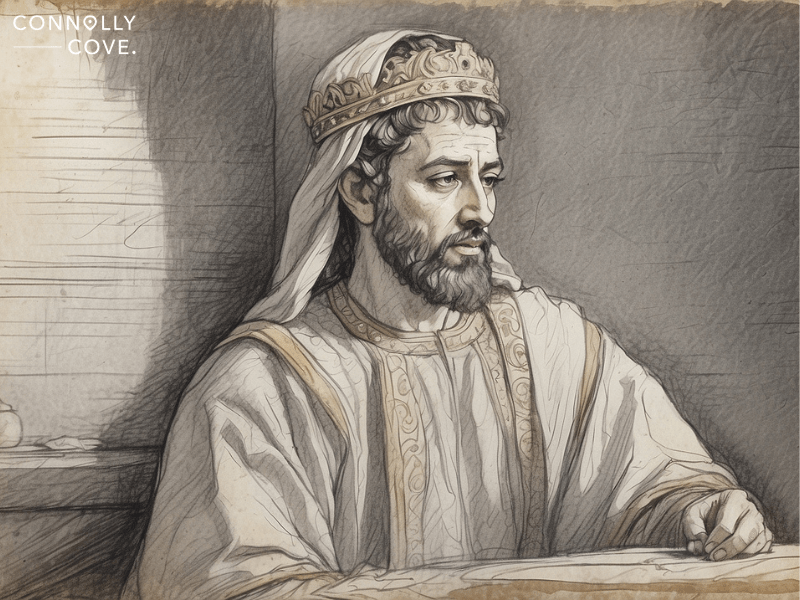King Herod in the Bible: The Tale of Herod the Great and Herod Antipas

Updated On: November 23, 2023 by Maha Yassin
Delving into the Bible can feel akin to tackling a complex jigsaw puzzle, each character adding their unique piece to an impressively grand narrative. You will feel completely absorbed when investigating such intricate details, notably in understanding the crucial role of King Herod in the Bible.
This character is often overlooked or perhaps oversimplified – but our fervent research revealed captivating insights about Herod the Great and his son, Herod Antipas. These two pivotal rulers indelibly influenced history in unexpected ways.
Intrigued? Wonderful! Let’s embark on an invigorating journey through time and decipher these significant figures and their influence on history.
Key Takeaways
- There are mentions of many rulers named King Herod in the Bible. However, the most notable are Herod the Great, King of Judea and his son Herod Antipas.
- Herod the Great is known for ordering the “Massacre of the Innocents” in Bethlehem after Jesus’ birth and had a close relationship with Emperor Augustus of Rome.
- His son, Herod Antipas, ruled over Galilee and Perea. He played a role in the stories of John the Baptist and Jesus but faced exile and eventually died in obscurity.
King Herod in the Bible: Who is Who?
In discussions about biblical history, a common confusion arises between Herod the Great and the various other rulers named King Herod in the Bible. Herod the Great, known for his expansive building projects and his rule during the birth of Jesus, is often conflated with his descendants, who also bore the name Herod and played roles in the New Testament.
For instance, Herod Antipas, one of Herod the Great’s sons, interacted with Jesus during his ministry and played a part in his trial. This overlap in names has led to misunderstandings in interpreting biblical texts and historical accounts, as the actions and timelines of Herod the Great and his successors are sometimes mistakenly attributed to one another.
Clarifying these distinctions is crucial for accurate biblical scholarship and understanding the complex Herodian dynasty’s impact on Judeo-Christian history.
Herod the Great: King of Judea

Herod the Great’s reign, from 37 BCE to 4 BCE, is remembered as a period of profound transformation and grandiose architectural achievements in Judea. Appointed King of Judea by the Roman Senate, Herod embarked on an ambitious agenda to modernise and beautify his kingdom. He is most renowned for expanding the Second Temple in Jerusalem, a project that endeared him to his Jewish subjects and remains a landmark in Jewish history.
However, his reign was also characterised by political astuteness, often aligning with Roman interests, and a ruthless suppression of dissent, including the execution of members of his own family. These actions, coupled with his imposing building projects, led to a dual legacy: Herod is celebrated for his contributions to the architectural and cultural landscape of Judea but is also remembered as a tyrannical figure whose reign was marked by intrigue, violence, and controversy.
His References in the New Testament
Herod the Great’s reign also intersects with one of the most pivotal events in Christian tradition – the birth of Jesus Christ. According to the Gospel of Matthew in the New Testament, Herod’s reaction to the news of the birth of Jesus, proclaimed as the “King of the Jews,” was one of deep insecurity and fear for his throne. This fear purportedly led to the infamous biblical event known as the Massacre of the Innocents, where Herod ordered the killing of all male infants in Bethlehem in an attempt to eliminate the prophesied new king.
This brutal episode, while not corroborated outside biblical accounts, has cemented Herod’s legacy in Christian tradition as a tyrant driven by paranoia and a relentless desire to maintain his power at any cost. This aspect of Herod’s reign, albeit primarily known through religious texts, significantly shapes his rule’s historical and cultural perception.
Herod Antipas: Tetrarch of Galilee and Perea
Herod Antipas, a name often overshadowed by his father, Herod the Great, played a significant yet complex role in the New Testament narrative. As a tetrarch of Galilee and Perea from 4 BCE until 39 CE, Antipas’s reign coincided with some of the most pivotal events in Christian history, including the ministries of John the Baptist and Jesus Christ.
His Early Life and Reign
Born to Herod the Great and Malthace, a Samaritan, Herod Antipas was a part of the Herodian dynasty that governed under Roman influence. Upon his father’s death in 4 BCE, the kingdom was divided among Herod’s sons. Antipas inherited Galilee and Perea, beginning a reign over four decades. Unlike his father’s grand architectural ambitions, Antipas focused more on administrative stability and regional development.
During his reign, Herod Antipas played a significant role in the stories of John the Baptist and Jesus. However, his decision to execute John the Baptist after Salome’s dance brought him notoriety. Despite his power and influence during this time, Herod Antipas eventually faced exile and death. His legacy as part of the Herodian dynasty is remembered in biblical accounts and archaeological findings from that era.
His Interaction with John the Baptist and Jesus
Herod Antipas is perhaps most famously known in the Bible for his interactions with John the Baptist and Jesus Christ. According to the Gospels, John the Baptist openly criticised Antipas’s marriage to Herodias, his brother’s former wife, as unlawful. This criticism eventually led to John’s imprisonment and execution, a decision that has been widely analyzed and criticised in Christian theology.
The Gospels also recount an intriguing interaction between Jesus and Herod Antipas. During the trial of Jesus, Pontius Pilate, learning that Jesus was a Galilean, sent him to Antipas, who was in Jerusalem at the time. Antipas, who had heard about Jesus and was curious to see him, initially welcomed the encounter. However, Jesus refused to perform any miracles or answer questions, leading a disappointed Antipas to mock him and send him back to Pilate. This episode, though brief, highlights the complex political and religious dynamics of the period.
His Downfall and Exile

Towards the end of his reign, Herod Antipas faced challenges and turmoil. He divorced his first wife and married Herodias, his brother’s wife. This caused controversy and moral outrage among the Jewish community. John the Baptist criticised this marriage publicly, leading to Herod Antipas ordering John’s execution.
Later on, when conflict arose between Antipas and Aretas IV of Nabatea (the father of his first wife), it resulted in a military defeat for Antipas. This defeat weakened his position as Tetrarch and eventually led to exile. Herod Antipas was banished by Emperor Caligula around 39 CE after being accused of conspiracy against him. He was exiled to Gaul (modern-day France), where he died in obscurity.
His Legacy and Family Tree
Herod the Great and Herod Antipas were influential biblical figures with a lasting legacy. Herod the Great, known for his ambitious building projects and rule over Judea, left behind an impressive architectural legacy that can still be seen today.
From fortresses to aqueducts and theatres to public buildings, he transformed the region’s landscape during his reign. However, he is also remembered for his cruelty in ordering the Massacre of the Innocents in Bethlehem after Jesus’ birth.
On the other hand, Herod Antipas ruled over Galilee during Jesus’ time and is best known for his role in John the Baptist’s story. He ordered John’s beheading after Salome danced for him. As a member of the Herodian dynasty and son of Herod the Great, he was part of a powerful family tree connected to Roman authority.
The legacy of these biblical kings continues to captivate historians and archaeologists alike as they study Jewish history and ancient Israel. Their stories are intertwined with important events mentioned in the New Testament, making them significant figures in biblical narratives.
Herod the Great VS. Herod Antipas
Though related by blood, Herod the Great and Herod Antipas showcased markedly different leadership styles and ambitions. Herod the Great was an autocrat with grand visions, focusing on monumental architecture and an iron-fisted approach to governance. He sought to leave a tangible legacy through buildings like the Second Temple, reflecting his desire to impress his Roman overlords and establish a lasting mark on Judean history.
In contrast, while inheriting his father’s political acumen, Herod Antipas lacked the same architectural ambition. His focus lay more on administrative management, maintaining stability in Galilee and Perea, and less on leaving a grand architectural legacy.
Political Maneuvering and Roman Relations
Both rulers adeptly navigated the complexities of Roman politics, but their approaches differed. Herod the Great maintained power through political savvy, brutality, and loyalty to Rome. He was a master at playing the political game, balancing the interests of his Jewish subjects with the demands of Rome. Herod Antipas, on the other hand, also managed to maintain good relations with Rome for most of his rule but ultimately fell out of favour, leading to his exile. His downfall was partly due to less astute political manoeuvring compared to his father.
Religious and Cultural Impact
The religious and cultural impacts of the two rulers are significantly divergent yet pivotal. Herod the Great’s expansion of the Second Temple ingratiated him with some Jewish factions. Still, his association with the Massacre of the Innocents left a dark stain on his legacy in Christian tradition. While less architecturally significant, Antipas’s impact is deeply entrenched in the New Testament narrative. His indirect role in the crucifixion of Jesus and the execution of John the Baptist positions him as a controversial figure in the interplay between the emerging Christian faith and Jewish traditions.
Legacy and Perception
The legacies of Herod the Great and Herod Antipas, when compared, reveal a complex tapestry of power, ambition, and morality. Herod the Great’s legacy is one of fear and admiration – feared for his ruthless suppression of dissent and admired for his architectural achievements. Herod Antipas’s legacy is more nuanced, often viewed as a ruler caught in his time’s tumultuous transition of religious and political shifts. His actions, especially regarding key New Testament figures, have made him a subject of scrutiny and debate in Christian theology and historical analysis.
In summary, the contrasts between Herod the Great and Herod Antipas highlight the diversity within the Herodian dynasty. Each ruler’s approach to power, politics, and interactions with religious movements of their time offers a unique perspective on the complexities of leadership in an era of significant historical and religious transformation. Their comparative analysis sheds light on their contributions and failings and the broader narrative of Judean history under Roman influence.
FAQs
Who was King Herod in the Bible?
King Herod, also known as Herod the Great, was a Jewish client king who ruled over the Roman province of Judea in the 1st century BCE.
What did King Herod do that is significant?
One of King Herod’s most notable actions was his rule over the Territory and being known as ‘King of the Jews’. He also built colossal buildings and made many changes to improve his Kingdom.
Was King Herod from Egypt?
Herod was born in Idumea, south of Judea. He was the second son of Antipater the Idumaean, a high-ranking official under ethnarch Hyrcanus II, and Cypros, a Nabatean Arab princess from Petra.
Is the story of King Herod true?
The story of King Herod killing all the children in Bethlehem when he heard of the birth of Jesus is only Biblical, with no other historical evidence. However, his existence as Ruler of Judea is, in fact, true.
Did King Herod convert to Christianity?
King Herod was raised as Jewish, and his people converted to Judaism during the 2nd century BC. When he learned of the birth of Jesus, King Herod tried to kill him in order not to be challenged as King of the Jews.






